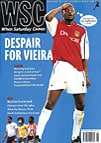 Preston North End fan Martin Atherton explains that with the exception of a few teams, there was not a lot to choose from the teams in Division One
Preston North End fan Martin Atherton explains that with the exception of a few teams, there was not a lot to choose from the teams in Division One
Having been a Preston North End fan since well before the club were last in the second level of English football 20 years ago, it was interesting last season to see how standards compared to the lower echelons we have inhabited for so long. Overall, I have to say that there was generally not a lot to choose between the top of the Second Division in 1999-2000 and the majority of the First Division last year.
The biggest differences were in the standard and pace of the passing of the better teams, with less reliance on overt physical intimidation. Some teams, such as Sheffield Utd and Tranmere, did, however, base their game on just this tactic. Surprisingly, this was also an aspect of both games against Nottingham Forest, although they could also play in a controlled way from the back.
Fulham and Blackburn were always the likeliest automatic promotion candidates, and their only credible long term rivals Bolton were a long way behind in class, although they in turn were better than most of the rest. I felt Blackburn were actually better than Fulham, who looked good going forward but were less effective when denied time and space; Rovers were generally defensively stronger. Fulham won points from psychology, with many opponents setting out to hold on to a point rather than trying to beat them.
As my own club showed, anyone who could maintain consistent form didn’t have to be that good to get into the play-offs. It is hard to say whether there is a genuine lack of class in the chasing pack, or a raising of overall standards; I suspect the former. The teams who came up from the Second Division the season before, Preston, Burnley and Gillingham, exceeded all expectations. North End continued their passing form under David Moyes, and Gillingham have maintained their defensive qualities but added some flair, as shown when they demolished North End 4-0.
We were all helped to adapt by the surprisingly weak challenge offered by so many of our rivals. West Brom could also be said to have played above themselves, having flirted with relegation the season before, but the two Sheffield clubs, Wednesday in particular, should have presented more of a threat. Many Preston fans were disappointed to come away from Hillsborough with only a 3-1 win against a team seemingly riven with internal problems.
The overall impression from playing the various underachieving teams is that many relied too much on one key player, with the inevitable consequences when injury or a loss of form intervened. Stop, for instance, Chris Bart-Williams at Forest or Martyn O’Connor at Birmingham, as Preston did in the play-off semi-final second leg, and you already had at least a point.
The most noticeable difference from the Second Division was in the standard of finishing; chances are missed with much less regularity at this level. Playing against someone like Blackburn’s Matt Jansen, even he is having an off day, is still harder than facing a top Second or Third Division forward. Overall, the standard of individual defenders did not look that much better. What was different was the way these players play as units. Chances for the strikers from defensive errors are few and far between compared to the lower levels, and defenders can recover from mistakes much better. Young Martin Taylor of Blackburn had a torrid time in the second half at Ewood, but with players such as Henning Berg and John Curtis to cover for him, Preston’s forwards did not benefit to the extent that they would have done the season before.
There were several players who looked to be potential stars. Perhaps the best undiscovered talent was Glen Little of Burnley, who deserves a bigger stage for his skills and ability on the ball. Another winger with bags of potential is Stuart Barrowclough’s son Carl at his dad’s old club Barnsley. He scared the life out of the Preston defence at Oakwell, despite playing in a team that lost 4-0. Crewe’s Mark Rivers is yet another product of the Dario Gradi school, while Patrick Agyemang of Wimbledon continues his club’s own reputation for unearthing diamonds.
At the bottom end of the table, the standard was often dire, with QPR and Tranmere the poorest teams seen; Palace were not much better. Tranmere demonstrated their rapidly growing reputation for only being able to perform in glamour games was justified, while Huddersfield were perhaps unfortunate to go down as I felt Portsmouth looked worse overall. Dario Gradi continues to work miracles at Crewe, and remains a shining example of how to manage a football club.
From WSC 174 August 2001. What was happening this month